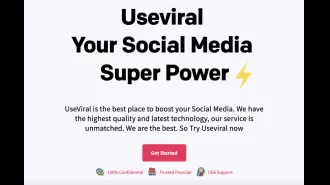Stages of a sales funnel are key to success in business.
Learn about the sales funnel stages, how they can help drive sales, and why they're important for success in business.
September 19th 2023.

Are you an aspiring or struggling business owner with dreams and goals but no strategy to reach them? If so, you've come to the right place! In this article, I'll discuss the importance of leveraging sales funnels to drive growth for your business.
Whether you are a seasoned business owner or an entrepreneur looking to increase sales, understanding and implementing a well-designed sales funnel can be a game-changer for your business. But before we dive in, let's take a look at what a sales funnel is and why it's essential.
A sales funnel is a visual representation of a customer's journey that shows the sales process from awareness to the point of action. It is also called a marketing funnel. It guides potential customers through a structured journey, handling their needs and concerns at each stage. With a sales funnel, you can gain valuable customer insights by tracking their behavior and engagement at each stage of the funnel.
A sales funnel is needed because it gives you adequate knowledge of who your audience is. It helps you classify every visitor based on their interests, needs, and pain points. With this information, you can invest in the proper marketing channels and create personalized experiences for each visitor in a way that would provide solutions to their problems.
There are many benefits to having a sales funnel. Structured marketing approach, personalization and targeting, improved conversion rate, customer insights, and customer retention and loyalty are just a few. With a sales funnel, you can narrow your business's focus to a specific group of prospects and direct them through a structured journey.
So who needs a sales funnel? The answer is simple: everyone. Startups and small business owners, e-commerce businesses, freelancers and solopreneurs, business-to-business organizations, and non-profit organizations can all benefit from having a sales funnel.
Let's take a look at the stages of the sales funnel. It is divided into 3 segments: the top, middle, and bottom. The top of the funnel consists of two stages: the awareness stage and the interest stage.
The awareness stage is the first and most crucial stage of a sales funnel. This is when you must attract a wide range of audience across different platforms. You can do this by organizing webinars, seminars, and events, reaching potential customers, and utilizing your social media. Storytelling is also a great way to drive attention to your business.
The interest stage follows the awareness stage and is a critical part of purchasing. Research has shown that the attention span of an average human is 8.25 seconds. So you must capture their attention quickly and efficiently. You can do this by providing valuable content and useful tools.
By understanding and implementing a well-designed sales funnel, you can maximize your sales and growth. It's an excellent strategy for customer retention and loyalty and provides you with valuable customer insights. So if you fit into any of the specifications mentioned above, consider setting up a sales funnel for your business.
Are you an ambitious business owner with big dreams but no strategy to accomplish them? If so, you’ve come to the right place! In this article, I will explore the various sales funnel stages and the importance of leveraging them to drive sales and growth for your business.
Whether you’re an experienced business owner or an entrepreneur looking to boost sales, understanding and implementing a well-designed sales funnel can be a game-changer for your business. So, let’s dive into the secrets of a successful sales funnel.
What is a Sales Funnel?
A sales funnel is a visual representation of a customer’s journey that shows the sales process from awareness to the point of action. It is also called a marketing funnel. It is one of the best and most simplified ways in which every business owner or entrepreneur can accomplish their business goals.
Why is a Sales Funnel Needed?
A sales funnel gives you adequate knowledge of who your audience is. It helps you classify every visitor based on their interests, needs, and pain points. With these insights, you can invest in the proper marketing channels and create personalized experiences for each visitor in a way that would provide solutions to their problems.
Benefits of a Sales Funnel
Here are some of the significant benefits of having a sales funnel:
1. Structured marketing approach: A sales funnel helps businesses have a structured marketing approach by facilitating lead capture, segmentation, nurturing, and constant improvement. By following an organized process, you can effectively manage and nurture leads, heighten their chances of conversion, and maximize their marketing efforts.
2. Personalization and targeting: A sales funnel will help you narrow your business’s focus to a specific group of prospects. This will help you reach your target audience members and convert them into customers easily as they reach the bottom of the funnel.
3. Improved conversion rate: A sales funnel helps improve conversion rates. It directs potential customers through a structured journey, handling their needs and concerns at each stage. Having a sales funnel optimizes your marketing efforts based on customer behavior and feedback. It also helps you deal with any limitations or barriers preventing leads from converting into customers.
4. Customer insights: With a sales funnel, you can gain valuable customer insights by tracking their behavior and engagement at each stage of the funnel. The data would help you understand customer preferences, pain points, and purchasing patterns. This enables you to adjust your marketing strategies accordingly and meet your customers’ needs.
5. Customer retention and loyalty: A sales funnel is an excellent strategy for customer retention and loyalty by providing a framework for engagement and connection. By nurturing leads and delivering personalized experiences, you can strengthen customer relationships, increase customer satisfaction, and encourage customers to return. The sales funnel also allows you to identify opportunities for upselling or cross-selling, further enhancing customer retention and loyalty.
Who Needs a Sales Funnel?
The answer is simple: every business needs a sales funnel! It doesn’t matter what size your business is, you need a sales funnel. A sales funnel is the roadmap to attract, engage, convert, and preserve your potential customers.
To help you better understand, here is a short list of people who mainly need to implement a sales funnel into their marketing strategy: startups and small business owners, e-commerce businesses, freelancers and solopreneurs, business-to-business organizations, and non-profit organizations.
Unpacking the Sales Funnel Stages
A sales funnel is divided into three segments: the top, middle, and bottom. It is essential to know that each of these sales funnel stages and approaches are specific to the different levels of your customer’s journey.
Top of the Funnel
This is where the lead generation process begins. This segment has two stages: the awareness stage and the interest stage.
Awareness Stage
This is the first and most crucial stage of a sales funnel. This is because it is the stage of recognition and visibility for your brand. At this stage, your goal as a business owner is to attract a wide range of audience across different platforms. The only thing you should think about is getting more people to be aware of your brand. To do this, you must organize webinars, seminars, and events, reach potential customers, and utilize your social media. Additionally, it would be best if you used the power of good storytelling for your brand. Storytelling conveys pure emotions that touch your audience. You can connect with your brand on a personal level. Storytelling is a great way to drive attention to your business.
Interest Stage
This stage comes right after the awareness stage and is a critical part of purchasing. Research has shown that the attention span of an average human is 8.25 seconds. At this stage, it is vital to provide content that is educational and interesting to capture the attention of potential customers. You can also utilize tools such as surveys, polls, and quizzes to engage and understand your audience better.
Whether you are a seasoned business owner or an entrepreneur looking to increase sales, understanding and implementing a well-designed sales funnel can be a game-changer for your business. But before we dive in, let's take a look at what a sales funnel is and why it's essential.
A sales funnel is a visual representation of a customer's journey that shows the sales process from awareness to the point of action. It is also called a marketing funnel. It guides potential customers through a structured journey, handling their needs and concerns at each stage. With a sales funnel, you can gain valuable customer insights by tracking their behavior and engagement at each stage of the funnel.
A sales funnel is needed because it gives you adequate knowledge of who your audience is. It helps you classify every visitor based on their interests, needs, and pain points. With this information, you can invest in the proper marketing channels and create personalized experiences for each visitor in a way that would provide solutions to their problems.
There are many benefits to having a sales funnel. Structured marketing approach, personalization and targeting, improved conversion rate, customer insights, and customer retention and loyalty are just a few. With a sales funnel, you can narrow your business's focus to a specific group of prospects and direct them through a structured journey.
So who needs a sales funnel? The answer is simple: everyone. Startups and small business owners, e-commerce businesses, freelancers and solopreneurs, business-to-business organizations, and non-profit organizations can all benefit from having a sales funnel.
Let's take a look at the stages of the sales funnel. It is divided into 3 segments: the top, middle, and bottom. The top of the funnel consists of two stages: the awareness stage and the interest stage.
The awareness stage is the first and most crucial stage of a sales funnel. This is when you must attract a wide range of audience across different platforms. You can do this by organizing webinars, seminars, and events, reaching potential customers, and utilizing your social media. Storytelling is also a great way to drive attention to your business.
The interest stage follows the awareness stage and is a critical part of purchasing. Research has shown that the attention span of an average human is 8.25 seconds. So you must capture their attention quickly and efficiently. You can do this by providing valuable content and useful tools.
By understanding and implementing a well-designed sales funnel, you can maximize your sales and growth. It's an excellent strategy for customer retention and loyalty and provides you with valuable customer insights. So if you fit into any of the specifications mentioned above, consider setting up a sales funnel for your business.
Are you an ambitious business owner with big dreams but no strategy to accomplish them? If so, you’ve come to the right place! In this article, I will explore the various sales funnel stages and the importance of leveraging them to drive sales and growth for your business.
Whether you’re an experienced business owner or an entrepreneur looking to boost sales, understanding and implementing a well-designed sales funnel can be a game-changer for your business. So, let’s dive into the secrets of a successful sales funnel.
What is a Sales Funnel?
A sales funnel is a visual representation of a customer’s journey that shows the sales process from awareness to the point of action. It is also called a marketing funnel. It is one of the best and most simplified ways in which every business owner or entrepreneur can accomplish their business goals.
Why is a Sales Funnel Needed?
A sales funnel gives you adequate knowledge of who your audience is. It helps you classify every visitor based on their interests, needs, and pain points. With these insights, you can invest in the proper marketing channels and create personalized experiences for each visitor in a way that would provide solutions to their problems.
Benefits of a Sales Funnel
Here are some of the significant benefits of having a sales funnel:
1. Structured marketing approach: A sales funnel helps businesses have a structured marketing approach by facilitating lead capture, segmentation, nurturing, and constant improvement. By following an organized process, you can effectively manage and nurture leads, heighten their chances of conversion, and maximize their marketing efforts.
2. Personalization and targeting: A sales funnel will help you narrow your business’s focus to a specific group of prospects. This will help you reach your target audience members and convert them into customers easily as they reach the bottom of the funnel.
3. Improved conversion rate: A sales funnel helps improve conversion rates. It directs potential customers through a structured journey, handling their needs and concerns at each stage. Having a sales funnel optimizes your marketing efforts based on customer behavior and feedback. It also helps you deal with any limitations or barriers preventing leads from converting into customers.
4. Customer insights: With a sales funnel, you can gain valuable customer insights by tracking their behavior and engagement at each stage of the funnel. The data would help you understand customer preferences, pain points, and purchasing patterns. This enables you to adjust your marketing strategies accordingly and meet your customers’ needs.
5. Customer retention and loyalty: A sales funnel is an excellent strategy for customer retention and loyalty by providing a framework for engagement and connection. By nurturing leads and delivering personalized experiences, you can strengthen customer relationships, increase customer satisfaction, and encourage customers to return. The sales funnel also allows you to identify opportunities for upselling or cross-selling, further enhancing customer retention and loyalty.
Who Needs a Sales Funnel?
The answer is simple: every business needs a sales funnel! It doesn’t matter what size your business is, you need a sales funnel. A sales funnel is the roadmap to attract, engage, convert, and preserve your potential customers.
To help you better understand, here is a short list of people who mainly need to implement a sales funnel into their marketing strategy: startups and small business owners, e-commerce businesses, freelancers and solopreneurs, business-to-business organizations, and non-profit organizations.
Unpacking the Sales Funnel Stages
A sales funnel is divided into three segments: the top, middle, and bottom. It is essential to know that each of these sales funnel stages and approaches are specific to the different levels of your customer’s journey.
Top of the Funnel
This is where the lead generation process begins. This segment has two stages: the awareness stage and the interest stage.
Awareness Stage
This is the first and most crucial stage of a sales funnel. This is because it is the stage of recognition and visibility for your brand. At this stage, your goal as a business owner is to attract a wide range of audience across different platforms. The only thing you should think about is getting more people to be aware of your brand. To do this, you must organize webinars, seminars, and events, reach potential customers, and utilize your social media. Additionally, it would be best if you used the power of good storytelling for your brand. Storytelling conveys pure emotions that touch your audience. You can connect with your brand on a personal level. Storytelling is a great way to drive attention to your business.
Interest Stage
This stage comes right after the awareness stage and is a critical part of purchasing. Research has shown that the attention span of an average human is 8.25 seconds. At this stage, it is vital to provide content that is educational and interesting to capture the attention of potential customers. You can also utilize tools such as surveys, polls, and quizzes to engage and understand your audience better.
[This article has been trending online recently and has been generated with AI. Your feed is customized.]
[Generative AI is experimental.]
0
0
Submit Comment





